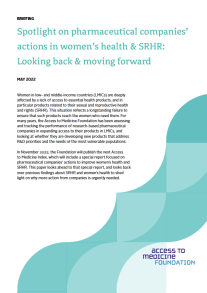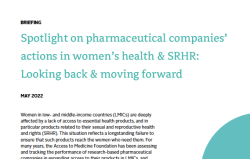Spotlight on pharmaceutical companies’ actions in women’s health and SRHR
Date
25 May 2022
Women living in LMICs are deeply affected by a lack of access to essential health products, and in particular products related to SRHR. This situation reflects a longstanding failure to ensure that such products reach the women who need them.
For many years, the Access to Medicine Foundation has been assessing and tracking the performance of research-based pharmaceutical companies in expanding access to their products in LMICs, and looking at whether they are developing new products that address R&D priorities and the needs of the most vulnerable populations.
Special report on women's health and SRHR in the 2022 Index
In November 2022, the Foundation will publish the next Access to Medicine Index, which will include a special report focused on pharmaceutical companies’ actions to improve women’s health and SRHR.
This Briefing looks ahead to that special report, and looks back over previous findings about SRHR and women’s health to shed light on why more action from companies is urgently needed.
The paper covers:
Urgent problems in women's health and SRHR
The impact of the COVID-19 pandemic
The momentum behind SRHR as a global health priority
The role of the Access to Medicine Foundation in driving progress
Looking back: Tracking the pharmaceutical industry's involvement in access to medicine
Looking forward: Recent examples of company actions
What next? Special report to follow in the 2022 Index
Key challenges in women's health and SRHR in LMICs
A lack of access to treatments for dangerous conditions such as hypertensive disorders of pregnancy, maternal sepsis, obstructed labour, miscarriage, endometriosis, and uterine cancer can have a huge impact on women’s quality of life, and can ultimately be life-threatening. For example, approximately 90% of those who die from cervical cancer are women living in LMICs, and most of those deaths would have been preventable through immunisation.
Unfortunately, the knock-on effects of the COVID-19 pandemic have made an already challenging situation worse, for example by disrupting HPV vaccination programmes, postnatal care, and access to family planning services.
The UN's Sustainable Development Goals (SDGs) should be achieved by 2030, and the global health community is working towards this ambition. But unless pharmaceutical companies and other global health stakeholders step up to increase access to medicines, vaccines and diagnostics in LMICs, it will not be possible to reach many of these goals – especially Goal 3, which is to “ensure healthy lives and promote well-being for all at all ages." This encompasses targets including reducing maternal mortality and granting universal access to sexual and reproductive care.

Margo Warren
Director of Government Engagement & Policy
mwarren@Accesstomedicinefoundation.org
Get in touch
